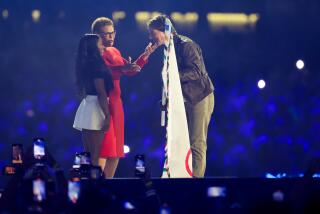From the first steppe, a thoroughly Russian showcase
- Share via
SOCHI, Russia — Ballerinas danced through gently falling snow.
A giant metallic fist hovered overhead, grasping a hammer in its silvery fingers.
With its barrage of traditional imagery set to strains of “Swan Lake,” the opening ceremony for the 2014 Sochi Olympics could not have been more Russian.
“The Sochi Games are our chance to show the entire world the best that our country is proud of,” Dmitry Chernyshenko, head of the organizing committee, told the crowd. “Our hospitality, our traditions, our Russia.”
So there was much at stake on Friday night at Fisht Olympic Stadium.
These Games had been plagued by construction delays and — with an unprecedented budget of $51 billion — allegations of widespread corruption. They had also been drawn into a debate over Russia’s controversial anti-gay legislation.
Organizers felt the burden of putting on a good show.
“We realized the opening ceremony carries the name of the country,” creative director Konstantin Ernst said. “It is viewed by billions of people.”
The worldwide television audience — and 40,000 in attendance — watched a nearly three-hour production that relied heavily on history and what Ernst called “plain metaphors.”
Large islands floated over the stadium floor, displaying scenes of village life from times long past. Next came bright snowflakes that were supposed to blossom into the five Olympic rings.
In a technical glitch, the fifth snowflake malfunctioned. Ernst said: “It would be ridiculous to focus on the ring that would not open.”
The producers then broke from tradition, placing the Parade of Nations near the beginning of the program.
Athletes entered through a ramp in the center of the floor and followed a quick route into the stands, which shortened the often tedious procession.
That allowed the show to proceed with electric horses that galloped through the air and, in the liveliest sequence of the night, helium balloons that inflated to re-create the colorful domes of St. Basil’s Cathedral.
Organizers declined to reveal the cost of Friday’s production, but this wasn’t the first time the Russians had placed enormous emphasis on opening night.
An Olympic tradition of quaint ceremonies changed at the 1980 Moscow Games, where a lavish production featured Greek figures on chariots and 5,000 pigeons taking flight at the lighting of the torch.
“They really started this idea of, ‘Let’s make a spectacle of it,’” sports historian Philip Barker said.
Los Angeles followed in 1984 with Etta James and a man arriving by jet pack as each successive host city joined in a game of “Can you top that?”
The opening ceremony for the 2008 Beijing Games is considered the most elaborate; the Chinese spent a reported $100 million and used more than 14,000 performers.
Sochi did not try to match those numbers, but the Russians employed 3,000 performers and shot off 22.5 tons of fireworks.
“When we prepared the ceremony, we made a mental journey back into the history of Russia,” Ernst said, adding that he wanted viewers to “experience this love of Russia.”
That would explain the visual and musical references to Tchaikovsky, Tolstoy and Nabokov. And a lengthy segment in which scores of dancers performed an interpretation of “War and Peace.”
There had been some speculation about how producers might deal with the Russian Revolution. They used massive props — a locomotive and steel girders that, like much of the show, were suspended in midair.
For the Soviet era, skyscrapers rose from the floor and white-coated workers banged away with pickaxes and shovels. There were nods to Sputnik and the Moscow Games.
“It was spectacular,” said Jamie Greubel, an American bobsledder. “Everything was breathtaking, from the lights, costumes, props, dancers and snow falling inside the stadium.”
Opening ceremonies always have one surprise waiting at the end: fans speculating about who will light the torch.
A series of famous athletes did the honors, beginning with tennis star Maria Sharapova and ending with figure skater Irina Rodnina and former hockey goalie Vladislav Tretiak, who jogged outside to the modern torch in the medals plaza.
Rodnina might have been a controversial choice in that she recently tweeted a racist image of President Obama and the First Lady.
Add it to the list of controversies surrounding these Games. Obama, British Prime Minister David Cameron and German Chancellor Angela Merkel did not attend on Friday night, their absence seen as a snub of Russian President Vladimir Putin and a protest of the anti-gay legislation.
“I’m not frustrated by the absence of anybody,” Thomas Bach, president of the International Olympic Committee, said earlier in the day. “That is everybody’s decision to come to the Games or not.”
The organizers similarly avoided political talk afterward.
“I wanted people all over the world to meet, understand and know us as Russians,” Ernst said. “The real Russians, untainted by decades of propaganda and the Cold War.”
Twitter: @LATimesWharton
More to Read
Go beyond the scoreboard
Get the latest on L.A.'s teams in the daily Sports Report newsletter.
You may occasionally receive promotional content from the Los Angeles Times.







